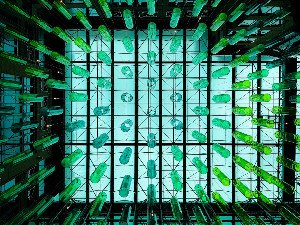Sukmawati, Patang, Andi Sukainah
PEMANFAATAN BAKTERI ASAM LAKTAT INDIGENOUS KOPI ROBUSTA SEBAGAI STARTER PADA FERMENTASI KOPI ARABIKA ASAL TORAJA
Introduction
Pemanfaatan bakteri asam laktat indigenous kopi robusta sebagai starter pada fermentasi kopi arabika asal toraja. Teliti pemanfaatan bakteri asam laktat indigenous kopi robusta sebagai starter fermentasi kopi arabika Toraja. Konsentrasi 5% terbukti optimalkan total gula, pH, polifenol, dan antioksidan kopi.
Abstract
Penelitian ini berupa penelitian eksperimen yang bertujuan untuk mengetahui pengaruh penambahan bakteri asam laktat indigenous terhadap mutu kimia kopi arabika hasil fermentasi. Rancangan penelitian menggunakan Rancangan Acak Lengkap (RAL) meliputi 3 perlakuan penambahan bakteri asam laktat indigenous yaitu perlakuan kontrol (0%), 4%, dan 5% menggunakan fermentasi basah selama 48 jam fermentasi. Parameter pengujian yaitu kadar abu, protein, total gula, gula reduksi, total asam tertitrasi, derajat keasaman, polifenol, dan antioksidan. Analisis data menggunakan program aplikasi IBM SPSS Versi 22.0. Penelitian ini memberikan hasil bahwa konsentrasi bakteri asam laktat berpengaruh terhadap total gula, gula reduksi, total asam tertitrasi, pH, Polifenol, dan antioksidan biji kopi arabika, namun tidak berpengaruh pada kadar abu dan protein biji kopi arabika. Perlakuan terbaik yaitu penambahan bakteri asam laktat indigenous 5% dengan kadar abu 3,32%; protein 0,84%, total gula 5,9%; gula reduksi 1,95%; TAT 0,41%; pH 6,3, polifenol 44,8%; dan antioksidan 19,5%.
Review
The study titled "PEMANFAATAN BAKTERI ASAM LAKTAT INDIGENOUS KOPI ROBUSTA SEBAGAI STARTER PADA FERMENTASI KOPI ARABIKA ASAL TORAJA" presents an insightful experimental investigation into the effect of indigenous lactic acid bacteria (LAB) from Robusta coffee on the chemical quality of fermented Arabica coffee from Toraja. This research addresses a pertinent area within coffee processing, aiming to enhance coffee quality through controlled fermentation, a topic of significant interest to both producers and consumers. The utilization of indigenous LAB is a particularly commendable approach, suggesting a sustainable and potentially specific method for improving regional coffee characteristics and adding value to local coffee varieties. The experimental design, employing a Completely Randomized Design (CRD) with three treatment levels (0%, 4%, and 5% LAB) during a 48-hour wet fermentation, appears robust for addressing the study's objectives. The comprehensive suite of chemical parameters measured—including ash, protein, total sugar, reducing sugar, titratable acidity (TAT), pH, polyphenols, and antioxidant activity—provides a thorough assessment of the fermentation's impact. The findings indicate that LAB concentration significantly influences several key quality indicators such as total sugar, reducing sugar, TAT, pH, polyphenols, and antioxidant activity, highlighting the bacterial impact on flavor precursors and health-beneficial compounds. Notably, no significant effect was observed on ash and protein content, suggesting the fermentation is more selective in its chemical transformations. The identification of a 5% LAB concentration as the optimal treatment, with detailed resulting values, offers practical guidance for potential application. Overall, this study makes a valuable contribution by demonstrating the potential of indigenous Robusta coffee LAB to improve specific chemical attributes of Arabica coffee from Toraja. The results suggest that controlled fermentation with these bacteria can lead to desirable changes in acidity, sugar profiles, and antioxidant properties, which are crucial for coffee quality and consumer appeal. For future research, it would be highly beneficial to complement these chemical analyses with sensory evaluations to correlate the observed chemical changes with actual cup quality. Additionally, investigating the specific strains of LAB responsible for these effects, optimizing fermentation conditions beyond the tested parameters, and assessing the economic viability could provide deeper insights and enhance the practical applicability of these findings. This research lays a solid foundation for developing sustainable and effective coffee fermentation protocols using indigenous microbial resources.
Full Text
You need to be logged in to view the full text and Download file of this article - PEMANFAATAN BAKTERI ASAM LAKTAT INDIGENOUS KOPI ROBUSTA SEBAGAI STARTER PADA FERMENTASI KOPI ARABIKA ASAL TORAJA from JURNAL PATANI: Pengembangan Teknologi Pertanian dan Informatika .
Login to View Full Text And DownloadComments
You need to be logged in to post a comment.
Top Blogs by Rating
The Uncomfortable Truth: Why G...
By Sciaria
Beyond the Forbidden: When His...
By Sciaria
The Elusive Self: Is Authentic...
By Sciaria
Favorite Blog
Big Data's Unintended Conseque...
By Sciaria
The Collective Gasp: Why Live...
By Sciaria
The Gamification of Governance...
By Sciaria





